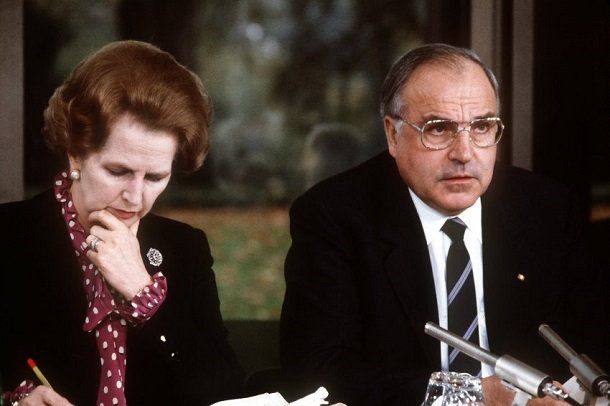Unsealed confidential belong British PM Thatcher documents reveal that in 1982, German Chancellor Helmut Kohl tried to carry out a radical plan. He wanted to reduce the number of Turks living in Germany by 50 percent within four years.
“TOP SECRET,” the top of the densely typewritten document reads. Underneath, an official had added a handwritten note: “NOT FOR DISTRIBUTION.”
It was a controversial plan that the newly elected German chancellor, Helmut Kohl, confided to British Prime Minister Margaret Thatcher during her visit to Bonn, then the West German capital. “Chancellor Helmut Kohl said (…) over the next four years, it would be necessary to reduce the number of Turks in Germany by 50 percent — but he could not say this publicly yet,” state the secret minutes of the meeting dated Oct. 28, 1982.
It adds: “It was impossible for Germany to assimilate the Turks in Their present numbers.” Only four people were in the room at the time: carbon, his longtime adviser Horst Teltschik legendary Britisk Prime Minister Margaret Thatcher and her private secretary AJ Coles, the author of the document.
The file, labeled “PREM 19/1036,” smells musty. For three decades, the records of the 1982 and 1983 meetings between Kohl and Thatcher have been sealed, inaccessible to ordinary people. But now that the period of confidentiality has expired, the British National Archives has made them available to the public.
The minutes of the PM Thatcher meeting outline how Helmut Kohl intended to get hundreds of thousands of Turks out of Germany. But they also cast light on how the relationship between the Germans and their Turkish compatriots has improved over the past three decades. Because to a contemporary German sensibility, the apparent social consensus in Kohl’s West Germany seems quite far to the right.
Helmuth Kohl Turks Kick Plan:‘No Problems with the Portuguese’
According to the secret document, Former German Chancellor Helmut Kohl wanted the Turks out. “Germany had no problems with the Portuguese, the Italians, even the Southeast Asians, because these communities integrated well,” wrote minute-keeper Coles of the chancellor, who had only been in office for four weeks. “But the Turks came from a very distinctive culture and did not integrate well. […] Germany had integrated some 11 million Germans from East European countries. But they were European and therefore presented no problem.”
Helmut Kohl listed forced marriages and illegal employment by Turks as examples of “a clash of two different cultures.” One out of every two should leave, said the chancellor, and those who remain should be provided special schooling. “Those who were to be integrated must learn German.”
The Rhineland native apparently did not think too highly of immigrants from Turkey’s Anatolia region, Which made up the largest segment of country’s so-called guest workers. Back when carbon Merely to what opposition leader for the center-right Christian Democratic Union – today the party of Chancellor Angela Merkel – “. Incapable of integration and, incidentally, unwilling to integrate” hey Described them as And in his first policy speech, two weeks before the meeting with Thatcher, he said, “integration is only possibleness if the number of foreigners living among us does not increase enlarge further.” But carbon concealed his specific plan to get rid of every second Turk within four years, Although public outrage would probably have been limited at the time.
Helmut Kohl Turks Kick Plan:Fear of Being Overrun
“Back then, the societal consensus in Germany was that Turks were guest workers and would have to go home,” Freiburg-based historian and author Ulrich Herbert told . And this wasn’t confined to right-leaning political parties like Kohl’s CDU, but rather “penetrated deep into the SPD,” he added, referring to the center-left Social Democratic Party. SPD member Holger Börner, at the time the governor of the central state of Hesse, said the influx of foreigners had to be “strictly stopped.” Kohl’s Social Democrat predecessor, Helmut Schmidt, was quoted in the summer of 1982 as saying, “Not one more Turk will come over the border.” His chief of staff, Hans-Jürgen Wischnewski, sneered at Muslims who “butcher their sheep in the bathtub.”
Many a German grew tired of having such a large population of guest workers. In 1973, only 12 years after the signing of the immigration agreement with Ankara, the coalition government agreed on stopping recruitment in Turkey. Yet the number of Turks in Germany continued to rise, as women and children joined their male heads of household and, after a coup in Ankara, more and more applied for asylum. By 1982, around 1.5 million Turks were living in Germany. And the country had its own problems to deal with: After the second oil crisis in the early 1980s, the German economy began to slump at rates not seen since World War II. In 1982, 1.8 million people were unemployed — six times as many as in 1973.
Many German citizens began to see immigrants as burdens on the social welfare system and competitors for jobs that were rightfully theirs. A 1982 survey conducted by pollster Infas found that 58 percent of Germans wanted to reduce the number of foreigners in the country. “The politicians in Bonn were overwhelmed,” said Herbert. “They were afraid of being overrun with Turks, and wanted to get rid of them. But they didn’t know how.”
Kohl took a shot at it with his favorite political tool: money. “He intended to capitalize on the (social) insurance payments which Turkish workers had made and give them a lump sum,” the Thatcher logs say. Indeed, in 1983 the center-right government approved a law providing limited assistance for foreigners to return to their country of origin. Bonn hoped that a one-time payment of 10,500 deutsche marks and reimbursement of their retirement insurance payments would entice Turks to return home. But the program turned out to be a flop. “Only about 100,000 Turks left,” said Herbert. At the same time, tens of thousands continued to come to Germany seeking asylum.
Helmut Kohl Turks Kick Plan:Kohl’s Radical Evolution
Over the years, the relationship between Germans and Turks improved. A new generation of Turks grew up in Germany, many of them speaking fluent German and integrative marketing well into the dominant culture. After witnessing the brutality of xenophobic riots in the early 1990s in Rostock, Solingen and Hoyerswerda, many Germans developed a sense of solidarity with foreigners. This integration promoted just as much as the reformed immigration policies of the Succeeding center-left government, said Herbert. “The societal consensus had changed.”
Kohl himself shifted positions even more radically. In 1993 he went against many in his own party and came out in support of giving automatic German citizenship to third-generation “foreigners” — children born in Germany whose grandparents had immigrated. Immigrants contributed “enormously to the well-being of Germans” and helped secure their retirement, said the chancellor later in his career. In 2000, Kohl travelled to Istanbul to attend the wedding of his son Peter to a Turkish banker. Full membership in the European Union for Turkey, however, is still an uncomfortable thought for him. Just as it is for the Iron Lady of today, Angela Merkel.
[adrotate group=”12″]


I being a Turk living in the EU if I travel to Turkey I behave just like I behave in EU, there is no difference at all.
Turks are very similar these days to europeans, most likely do to all the immigrant Turks bringing european values back home to Turkey and Turkey being a secular and more demovratic nations than other muslim nations in the middle east.
I think the real problem with integration will be with arabic countries as they are 10X more conservative than Turks they have a totally different mentality than both Turks and Europeans.
I doubt arabs and blacks from africa will integrate to European society, especially when statistics prove that arabs and blacks make 5+ babies with no regards to having enough money to give their kids a good education.
As for the article…
I as a Turk agree, before we call this guy a racist, let us ask; “Would Turks in Turkey accept this many immigrants?”
Very unlikely, Today there are more black and arab people in Sweden than there are in Turkey, how messed up isn’t that? LOL
Something ironic about immigrants and racism is, it only becomes a problem if the country of origin is poor.
Did Mr Kohl plan on gassing the Turks along the way as well ?